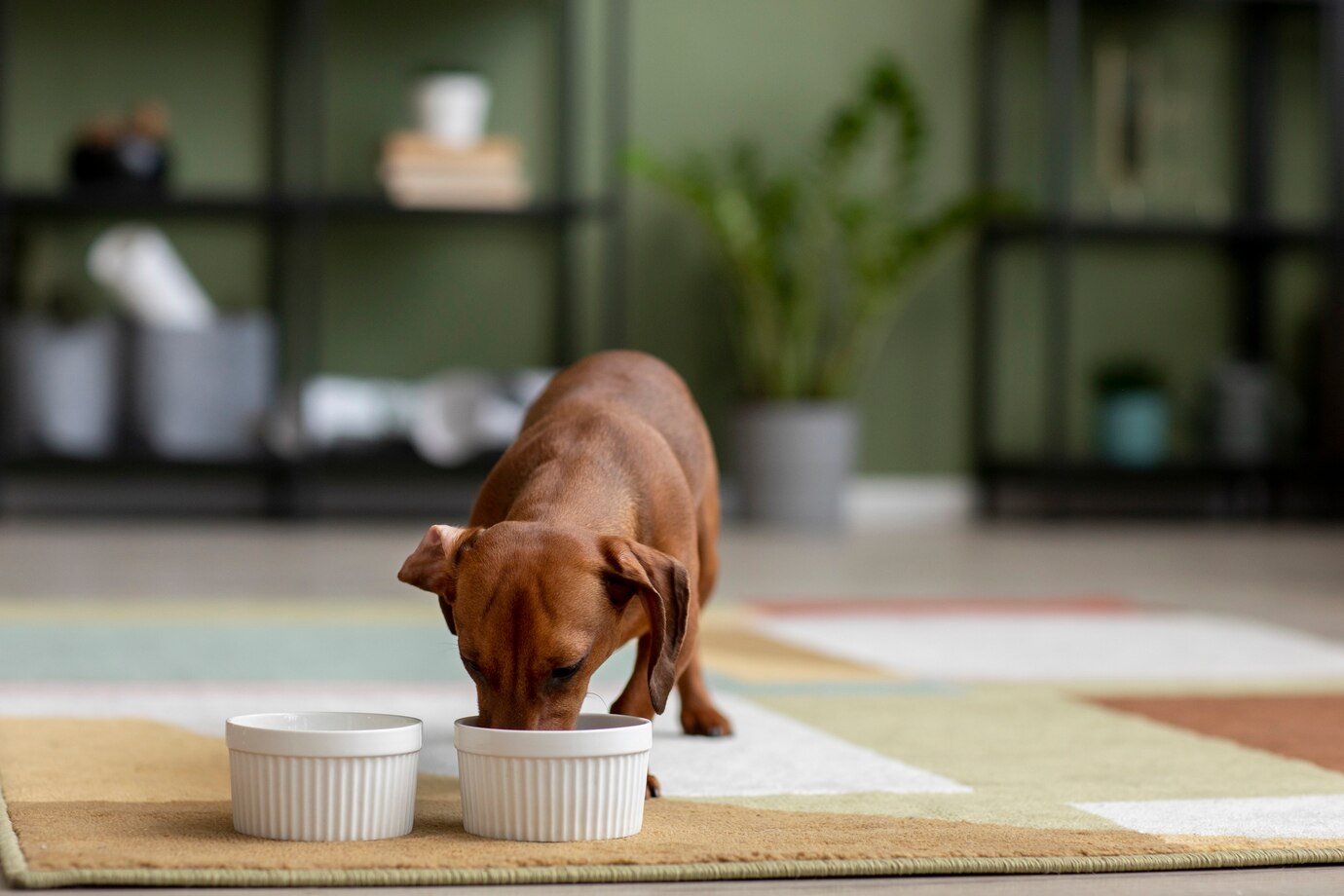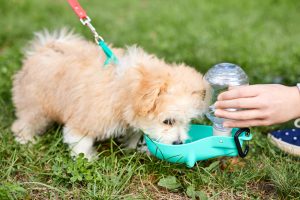How Much Water Should a Puppy Drink & When?

Updated October 13, 2025
Keeping your puppy hydrated is a key part of their health and happiness. Water is essential for helping them stay cool, digest food, and power their playful energy. Puppies, especially when they’re growing fast, need plenty of water. They can become dehydrated without enough water, leading to tiredness, constipation, or even more serious issues.
When Can Puppies Start Drinking Water?
By the time most pet owners get their first puppy, usually after the puppies are older than four weeks, they have already started drinking water, as they are weaned off their mother’s milk.
Since this period is a big step in a puppy’s life, they’re adjusting to new food, learning new behaviors, and even drinking water from a bowl for the first time; you can encourage them by:
- Placing a shallow dish of water nearby so it’s easy to reach.
- Dipping their muzzle gently in the water to show them it’s there.
- Using a shallow, non-slip bowl to ensure it doesn’t tip over.
By the time they’re six to eight weeks old, puppies are usually weaned and should be able to rely on puppy food and water as their main diet. Keep an eye on them and be patient—it can take a bit of practice for some pups to get the hang of it!
How Much Water Should a Puppy Drink?
The amount of water a puppy needs changes as they grow and depends on their age, size, and activity level. Here’s a quick guide:
- 4-8 weeks old: About 0.5 to 1 cup (120-240 ml) per day.
- 8-12 weeks old: 1 to 2 cups (240-480 ml) as they shift to solid food.
- 3-6 months old: Around 2 to 4 cups (480-960 ml), depending on activity.
Now, for older puppies, you can calculate the amount of water they need. Typically, they require one-half ounce and one ounce of water per pound of body weight daily. Therefore, a puppy that weighs 30 pounds should have between 15 and 30 ounces of water daily.
If it’s hot outside, or if your puppy’s very active, they might need a bit more. Likewise, if you ever notice signs of dehydration, such as sunken eyes, dry gums, or tiredness, it’s always a good idea to consult your vet.
Establishing a Water Schedule
While puppies should always have access to fresh water, establishing a drinking routine can also be beneficial. Here’s a simple schedule to keep your puppy happy and hydrated:
- In the morning: Offer water first thing when they wake up.
- Around meals: Let them drink during or after their meals.
- After playtime: Puppies love to play hard, so give them water afterward to prevent dehydration.
- Before bedtime: Offer water a few hours before bed, and then remove the bowl about two hours before they sleep to reduce overnight accidents.
This approach can help develop healthy drinking habits and create a routine they’ll find comforting.
When to Cut Off Water for Your Puppy at Night
Limiting water intake before bedtime for young puppies can reduce nighttime bathroom trips. Here’s a rule of thumb:
- Two to three hours before bed: Stop providing water to give them time to empty their bladder. You might need to cut off water earlier for young puppies (under four months) to prevent accidents.
If your puppy wakes up during the night and needs to go potty, you can offer them a small amount of water afterward.
Canine Dehydration
As stated in the American Kennel Club article: “Most dogs, even puppies, naturally self-regulate when it comes to drinking water. But there are cases when your puppy may not drink enough and risk dehydration. Some potential causes of dehydration include vomiting, fever, excessive urination, or diarrhea.
Some dogs don’t seem very tempted by their bowl of fresh water. If your puppy eats mostly dry food, they also may not be getting enough water. Aside from noticing any of the causes listed, you can get a good idea of whether your puppy is drinking enough water by monitoring their water intake using the water-to-body-weight calculation.
Overhydration in Dogs
Believe it or not, dogs can overhydrate, as well. Also called “water intoxication,” overhydration can be as dangerous as dehydration. It can be caused by drinking too much water, including water the dog inadvertently takes in while swimming or playing in the water.
If you suspect that your dog is overhydrated or exhibiting any of these symptoms, contact your veterinarian:
- Lethargy
- Nausea
- Loss of coordination
- Staggering
- Bloating
- Dilated pupils
- Excessive salivation
- Vomiting
- Pale gums
Puppies that drink more water than usual may have polydipsia, which could be a sign of underlying metabolic changes, such as kidney issues, infection of the uterus, diabetes, or Cushing’s disease. This is especially true if it’s paired with an increase in urination. Always check with your veterinarian if you have concerns about the puppy’s water intake.
Having a new puppy comes with so many responsibilities. You must decide what food to use, which toys are safe, how to housetrain, and more. However, monitoring water intake is just as important and should become a part of routine daily care. Proper hydration contributes to your puppy’s overall health and well-being.”
FAQs
How much water should a puppy drink daily?
Puppies need about 0.5-1 ounce of water per pound of body weight daily. For example, a 10-pound puppy should drink 5-10 ounces of water per day. Most puppies self-regulate their water intake, but monitor to ensure proper hydration. Puppies typically begin drinking water at 3-4 weeks old as they transition from milk to solid food.
What factors affect how much water my puppy needs?
Factors include size, age, exercise level, weather conditions, diet type (dry food 15-30% water vs. wet food 50-75% water), and medications. Active puppies, those in hot climates, or eating dry kibble, need more water. Always offer water after vigorous play or exercise.
Should I leave water out all day, and when should I offer it?
Yes, puppies should have access to fresh water throughout the day. Exception: Remove water about 2 hours before bedtime during potty training to reduce nighttime accidents. Offer water after meals, after playtime, and keep it available throughout the day. Clean the bowl and change the water daily.
What are the signs of dehydration and overhydration?
- Dehydration: Lethargy, dry/sticky gums, sunken eyes, loss of appetite, decreased skin elasticity (skin tents when pulled), dark urine. Offer water and contact your vet immediately.
- Water intoxication (overhydration): A life-threatening condition from excessive water intake, causing low sodium and brain swelling. Both require immediate vet attention.
Why is my puppy drinking more or less than usual?
- Drinking more (polydipsia): May indicate kidney problems, diabetes, Cushing’s disease, or uterine infection, especially if paired with increased urination.
- Drinking less: Try keeping water fresh, positioning the bowl near favorite spots, adding chicken/bone broth, mixing water into food, or offering ice cubes. If the puppy refuses water for several hours, contact the vet immediately.




